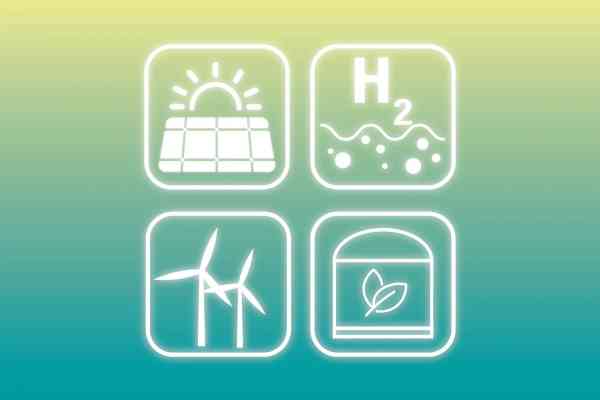March 14th, 2024 | 06:15 CET
Porsche, First Hydrogen, Mercedes-Benz: Which shares offer growth potential in the transformation phase towards clean energy?
The German automotive industry is facing drastic changes, one of the biggest transformation phases in history. The "Green Deal" is forcing car manufacturers to completely overhaul their requirements and supply chains. Porsche announces the introduction of hybrid drive in its popular 911 models, and the Macan is set to be offered entirely as an electric vehicle. However, CEO Blume links the transition to an important condition. Forecasts by McKinsey show that clean hydrogen will account for a significant part of the global energy supply by 2030. In this context, First Hydrogen is playing a decisive role in the development of zero-emission transportation solutions. First Hydrogen is developing emission-free vehicles and green hydrogen production in Vancouver, Montreal and London. In partnership with AVL Powertrain and Ballard Power Systems Inc., the Company is working on hydrogen-powered light commercial vehicles with a range of over 630 km. Around 8,000 Mercedes-Benz employees in Germany are currently experiencing the fact that the green transformation can be painful. We provide the details.
time to read: 7 minutes
|
Author:
Juliane Zielonka
ISIN:
PORSCHE AUTOM.HLDG VZO | DE000PAH0038 , PORSCHE AG | DE000PAG9113 , First Hydrogen Corp. | CA32057N1042 , MERCEDES-BENZ GROUP AG | DE0007100000
Table of contents:

"[...] Why should a modular electrolyzer cost more than a motorcycle? [...]" Sebastian-Justus Schmidt, CEO and Founder, Enapter AG
Author
Juliane Zielonka
Born in Bielefeld, she studied German, English and psychology. The emergence of the Internet in the early '90s led her from university to training in graphic design and marketing communications. After years of agency work in corporate branding, she switched to publishing and learned her editorial craft at Hubert Burda Media.
Tag cloud
Shares cloud
Porsche pushes ahead with electrification: Hybrid 911 and strong revenue growth in fiscal year 2023
The week starts with rumors from Brussels about the "end of the combustion engine". However, there is neither a ban on combustion engines nor an obligation to switch to electric cars. Instead, the EU's goal is climate-neutral mobility. From 2035, car manufacturers can only sell vehicles with zero climate-damaging emissions. Until then, there will be gradual reductions in fleet emission limits. In fall 2024, it will be assessed whether and how e-fuels can contribute to CO₂ neutrality. The effectiveness of the planned CO₂ reduction will be reviewed again in 2026 to subsequently adapt the relevant laws.
In this transformation phase, the German automotive industry must restructure its supply chains and adapt its requirements and dependencies. BVL CEO Prof. Dr.-Ing. Thomas Wimmer comments: "In addition to the battery-powered electric drive, which is mainly used in the passenger vehicle sector, there are variants such as plug-in hybrids or fuel cell drives, as well as combustion engines. This impacts production logistics, which we have to deal with."
The transition phase with Porsche already began this summer with the hybrid equipment of its renowned 911 model. The most significant change concerns the entry-level Macan model, which will no longer be available as a combustion engine in Europe starting in the summer and will only be available as an electric version. CEO Oliver Blume is sticking to the electrification course despite declining sales figures. His plan is for more than 80% of vehicles sold to be purely electric by 2030. **According to the news magazine Welt, Blume sets a perfectly understandable condition: His course is dependent on the development of demand and the markets.
Despite a slight decline in sales, the German automotive industry expects an increase in electric car sales in 2024. Due to the abrupt end of state subsidies for private electric vehicles in December last year, the German electric vehicle market is under severe pressure. The e-car subsidy change at the end of 2022 led to premature new registrations. The weak sales volume at the start of 2023 is impacting growth in January 2024.
In 2023, the Company achieved sales of EUR 40.5 billion, which corresponds to growth of 7.7% compared to the previous year (EUR 37.6 billion). The operating result rose by 7.6% to EUR 7.3 billion (previous year: EUR 6.8 billion). The Company's operating return on sales remained stable at 18.0% despite global supply chain disruptions, strong inflation and high investments. Lutz Meschke, Deputy Chairman of the Executive Board and Executive Board Member for Finance and IT, attributes the strong result to the high product attractiveness and cost discipline. Net cash flow from the automotive business amounted to EUR 4.0 billion in the 2023 financial year (previous year: EUR 3.9 billion). The Porsche share is currently trading at EUR 87.62.
At the forefront of transformation: First Hydrogen develops hydrogen drive for the logistics industry
Automotive groups such as Porsche are converting their supply chains in the transformation phase to CO₂-reduced drive systems and focusing on hybrids for their most popular models. Different rules apply for the logistics industry than for private consumers. Every gram of weight counts, especially for vans used for journeys within built-up areas or for longer distances. The heavier a vehicle, the more fuel it consumes. Pure electric battery technology is too heavy for larger vans in terms of overall weight.
This is precisely where the Company First Hydrogen comes in. Based in Vancouver, Montreal, and London, UK, First Hydrogen focuses on zero-emission vehicles and green hydrogen production and distribution. In partnership with AVL Powertrain and Ballard Power Systems Inc., the Company is developing hydrogen-powered light commercial vehicles (FCEV) with a range of over 630 km. These are currently being tested with fleet operators in the UK.
The current vehicle tests with Wales & West Utilities (WWU) demonstrate the remarkable performance of First Hydrogen's FCEV, which shows no loss of performance in colder temperatures. Data over more than 1,000 km indicates that the FCEV has operated in temperatures between 2°C and 17°C without compromising range. This is important for fleet operators who depend on reliable ranges.
According to McKinsey, the industry is expected to drive the majority of clean hydrogen use by 2030, followed by broader use in new applications by 2050. Existing applications are expected to account for the majority of demand for clean hydrogen in the 2020s. This could increase the share of clean hydrogen in total demand from less than 1% today to around 30% by 2030 in the scenario of further acceleration. Investors can be part of First Hydrogen from the beginning to support the transformation towards a carbon-free logistics industry. In addition, First Hydrogen is planning a 35 MW green hydrogen production facility and a vehicle assembly plant in Shawinigan, Quebec, Canada.
Mercedes-Benz sells its car dealerships: 8000 employees affected, CEO calls for more competition
According to BILD, a secret meeting of Mercedes-Benz AG took place at the Company headquarters at the start of the week, at which Britta Seeger, Board Member for Sales, and HR Board Member Sabine Kohleisen, announced the plans to sell 83 car dealerships. Mercedes aims to save EUR 800 million by foregoing investments in car dealerships. The money would have been invested in new design, ambience, and customer service in order to keep up with the competition.
Instead, the focus is on production. So the transformation of the energy transition is eating up the jobs of sales staff at regional level first. The sale announcement will be made on March 18, 2024. Mercedes expects to be approached by interested parties for the bidding process, which is aimed exclusively at automotive trade groups.
Affected are 20 branches and the jobs of around 8,000 employees. The Works Council has strongly criticized the Management Board for this decision. Starting next week, the employer and employees will negotiate the conditions. The Works Council is firmly opposed to the sale and is calling for the jobs to be retained and for good working conditions after the sale.
At the same time, CEO Ola Källenius, according to the Financial Times is calling for more competition within the EU. The head of Mercedes-Benz AG is calling on the European Commission in Brussels to reduce tariffs on electric cars imported from China. This comes just as the European Commission is considering raising import tariffs in its ongoing investigation into Beijing's subsidies for the automotive industry.
Increased competition from China would help European carmakers produce better vehicles in the long run, says CEO Ola Källenius, adding that protectionism "*is going in the wrong direction.* Do not raise tariffs. I am a contrarian, I think differently: take the tariffs we have and reduce them," he told the business news magazine. Chinese companies that want to export to Europe are a natural evolution of competition and must be met with better products, better technology, more agility.* "This is the market economy. Let competition play out*." 8,000 jobs in Germany will be put at risk. The share price is EUR 72.47.
Porsche is pushing ahead with electrification, with a focus on hybrid and electric drives. CEO Blume clearly identifies supply and demand as the basic prerequisite for change. First Hydrogen is playing a pioneering role in the development of emission-free transportation solutions and green hydrogen production. With a focus on hydrogen-powered light commercial vehicles and partnerships with industry leaders such as AVL Powertrain and Ballard Power Systems Inc., the Company is changing the logistics industry. Mercedes-Benz is facing radical change. With the sale of the regional car dealerships, the Group is saving around EUR 800 million, which is earmarked for the restructuring of production. 8,000 jobs will be cut as a result. The decision triggers fierce criticism from the Works Council. CEO Källenius is floating in global spheres and calling for more EU competition by lowering import tariffs for Chinese electric vehicles. Investors should keep a close eye on all three players and consider that vehicles are not only sold in Germany. Nevertheless, as a location, Germany is particularly disadvantaged due to local energy and economic policies. A look at the global level helps in making a suitable investment decision.
Conflict of interest
Pursuant to §85 of the German Securities Trading Act (WpHG), we point out that Apaton Finance GmbH as well as partners, authors or employees of Apaton Finance GmbH (hereinafter referred to as "Relevant Persons") may hold shares or other financial instruments of the aforementioned companies in the future or may bet on rising or falling prices and thus a conflict of interest may arise in the future. The Relevant Persons reserve the right to buy or sell shares or other financial instruments of the Company at any time (hereinafter each a "Transaction"). Transactions may, under certain circumstances, influence the respective price of the shares or other financial instruments of the Company.
In addition, Apaton Finance GmbH is active in the context of the preparation and publication of the reporting in paid contractual relationships.
For this reason, there is a concrete conflict of interest.
The above information on existing conflicts of interest applies to all types and forms of publication used by Apaton Finance GmbH for publications on companies.
Risk notice
Apaton Finance GmbH offers editors, agencies and companies the opportunity to publish commentaries, interviews, summaries, news and the like on news.financial. These contents are exclusively for the information of the readers and do not represent any call to action or recommendations, neither explicitly nor implicitly they are to be understood as an assurance of possible price developments. The contents do not replace individual expert investment advice and do not constitute an offer to sell the discussed share(s) or other financial instruments, nor an invitation to buy or sell such.
The content is expressly not a financial analysis, but a journalistic or advertising text. Readers or users who make investment decisions or carry out transactions on the basis of the information provided here do so entirely at their own risk. No contractual relationship is established between Apaton Finance GmbH and its readers or the users of its offers, as our information only refers to the company and not to the investment decision of the reader or user.
The acquisition of financial instruments involves high risks, which can lead to the total loss of the invested capital. The information published by Apaton Finance GmbH and its authors is based on careful research. Nevertheless, no liability is assumed for financial losses or a content-related guarantee for the topicality, correctness, appropriateness and completeness of the content provided here. Please also note our Terms of use.




